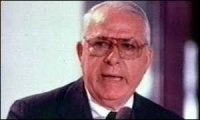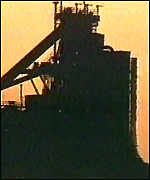|
Newsletter
July 1998
Obituary –
Ian MacGregor
EVERY SO often our
newsletters have carried obituaries of comrades and friends of the Justice
Campaign. All these deaths sadden us, but none more so perhaps than
when it is some veteran of the labour movement, with service to the
working class going back decades, who falls by the wayside,
Once in a while,
however, the demise of someone brings quite different thoughts to mind
and Ian MacGregor, the Chairman of the National Coal Board at the time
of the strike, was one such person. His recent death inevitably takes
us back to that tumultuous year from March 5th 1984 to March 5th 1985.
 |
|
Ian
MacGregor died April 1998 aged 85
|
Ian MacGregor (a.k.a.
Mack the Knife), who died on April 14th 1998 aged 85, was hailed by
the obituary writers as the man who won the 1984-85 miners' strike for
Margaret Thatcher and the Tories. They praised him as the hard-nosed
US manager who lured Arthur Scargill and the miners into a war they
were doomed to lose.
But while the ruling class celebrated one of their most vicious fighters,
Ian MacGregor's life has important lessons for trade unionists about
the relationship between governments (including Labour), trade union
leaders and big business. The case of Ian MacGregor shows there is nothing
new about Tony Blair's open door to big business: it is, after all,
a time honoured tradition of all governments. MacGregor spent most of
his working life in the US, building up a reputation as a vicious union
buster.
In 1975, after he had broken a bitter two year long strike, he found
his services were called upon by the then Labour government in Britain.
Eric Varley, industry minister at the time, recalled, "MacGregor
had a record of industrial efficiency and overall performance. He said
he was sad about the demise of British industry, manufacturing in particular.
He wanted to contribute and believed he could, based on his US experience.
That is how he was encouraged."
The Labour government gave MacGregor a place on the board of British
Leyland, the then nationalised car company, and made it plain he was
expected to lead a crackdown on the unions. By 1980 with the sacking
of 'Red Robbo', the Communist Party convenor of the giant Longbridge
car plant, under his belt, Margaret Thatcher made MacGregor head of
British Steel where he slashed 80,000 jobs. Then two years later she
moved him to British Coal.
His instructions were simple – to extract revenge for the 1972
and 1974 miners' strikes, which had broken Ted Heath's Tory government,
and to break Arthur Scargill who had just been elected leader of the
miners' union. MacGregor described what happened next as 'setting up
the ducks'. But the miners were not sitting targets and the outcome
of their fight was not a foregone conclusion. MacGregor initially expected
to beat the miners within a few weeks. Then, as the first flying pickets
fanned out, his memoirs tell us, "I came to believe we were probably
in for a three to six month long dispute."
Both MacGregor and Thatcher were devastated by the success of the miners'
pickets. The Coal Board boss recalled that between Scargill's executive
meeting on 8th March (1984) and Tuesday 13th March all but 30 of the
171 pits were picketed into submission and only 11 would be left working
normally 48 hours later.'
It is now generally
assumed that the miners used violence to achieve this success, but the
truth is that the real violence in the strike came after MacGregor demanded
and Thatcher ordered a massive police crackdown on the pickets.
Even with an unprecedented mobilisation of the police to contain the
pickets, MacGregor was ready to throw in the towel early in the dispute
when he tried to use the government's anti-union laws against the miners
and Thatcher ordered him to back off.
This was the first
of several occasions when MacGregor and Thatcher wobbled and could have
been beaten. Other decisive moments included the battle for Orgreave
in June 1984 which had the potential to bring other workers into action
alongside the miners, a two week long dockers' strike in July 1984,
and the abortive strike by pit deputies in October 1984 when Thatcher
was ready to give in.
The miners were eventually beaten, but not by Thatcher and MacGregor
and their massed ranks of police. Defeat was not the result of the NUM's
refusal to ballot its members or to stop scabbing in Nottinghamshire
either. The strike was eventually broken by the failure of the trade
union leaders to deliver the solidarity they had promised.
Ned Smith, the Coal Board's director of industrial relations for most
of the strike, made this plain as early as February 1985, when he told
Channel 4 News that the turning point for the employers and government
had been the TUC's refusal to implement its decision to halt the movement
of scab coal and oil.
 |
|
Under
MacGregor, the sun set on thousands of miners' jobs
|
The trade union
leaders' failure to deliver the support they had promised was to be
expected, but less widely known at the time was the extent to which
many union leaders cooperated with MacGregor throughout the strike.
His memoirs tell us that John Boyd of the engineers was "one of
my most important confidants on union matters and has always been a
sound adviser. Throughout the strike we met...and I always took advantage
of these opportunities to chat with him about the state of play. Through
him I also had come to know and respect the AUEW president Terry Duffy,
for whom I had as much regard. In fact, there were a number of trade
union leaders with whom I could communicate and talk frankly, including
Gavin Laird, Gerry Eastwood, Alan Tuffin of the communications workers
and of course, Frank Chapple of the electricians."
Even more staggering is MacGregor's recollection of long negotiating
sessions with the new TUC general secretary Norman Willis in early 1985.
With mining families in desperate poverty and the police terrorizing
pit communities, the leader of British trade unionism was not touring
the country drumming up solidarity. Instead he was cosying up to MacGregor,
first at the Ritz Hotel and then at MacGregor's private flat in Eaton
Square where, says MacGregor, "I made the tea and poured the whisky."
We should not forget
the lessons of the miners' strike. For all the talk of partnership and
moderation, the bosses know there is a constant class struggle taking
place which, when necessary, they are prepared to wage with the utmost
brutality. The second lesson is that the more serious the confrontation
with the bosses and the state, the more spineless and treacherous many
trade union leaders can become.
Brief Biography
MacGregor was born on September 21, 1912. He received his education
in both Edinburgh and Glasgow and graduated from Glasgow University
with a first-class honours degree in metallurgy.
After working first
for his father's British Aluminium Company and other firms, he went
to the United States with the British Tank Mission to buy tanks during
World War II and stayed.
He rose through
the ranks of US industry to become President of American Metal Climax
Incorporated in 1966.
A decade later he
returned across the Atlantic to take up the post of non-executive Deputy
Chairman of British Leyland.
His first brush
with the adverse publicity that would be a feature of his life was when
the House of Commons got official confirmation he was the man favoured
by the then Labour government for the top job at British Steel.
In May 1980, one
year into Thatcher's leadership, Parliament heard the government proposed
to pay a transfer fee of up to £1.8m to the US merchant bank Lazard
Freres as compensation because it would lose a senior partner.
But while revolt
threatened on the Tory back-benches, he described the job as "a
short-term assignment". He said: "I expect to outlive that.
I expect to be gainfully employed after that."
He transferred again,
to National Coal in 1983 at the request of the prime minister, resulting
in a further £1.5m bonanza for Lazard Freres.
Miners' hate
figure
From the start the move was deeply resented and opposed by the miners
and their leaders. The head of the National Union of Mineworkers, Arthur
Scargill, promptly dubbed him "the American butcher of British
industry".
By the next year,
the miners had gone on a national strike and MacGregor risked abuse
and being spat at whenever he went outside but his real role was recognised
by the government for what it was a year after the strike ended when
he received his knighthood.
Mick McGahey:
"I will not suffer any grief"
News of his death brought the following assessment of his life by former
NUM Vice President and Scottish miners' leader, Mick McGahey, who said:
"It's no loss to people of my ilk. MacGregor was a vicious, anti-trades
unionist, anti-working class person, recruited by the Tory government
quite deliberately for the purpose of destroying trade unionism in the
mining industry...I will not suffer any grief, not will I in any way
cry over the loss of Ian MacGregor."
Post Script
We are unable to bring you news of the death of Margaret Thatcher at
the time of writing, who seems to be outliving many of her henchmen
from the strike. Perhaps she's one of those dark creatures from legend
who draws all her strength and powers from sucking out the lifeblood
from the young and vigourous in her midst, for she certainly sucked
all the lifeblood out of hundreds of mining communities during the strike
and from millions of people since.
|
|
|
|
Date
this page updated:
September 29, 2006
|
|

